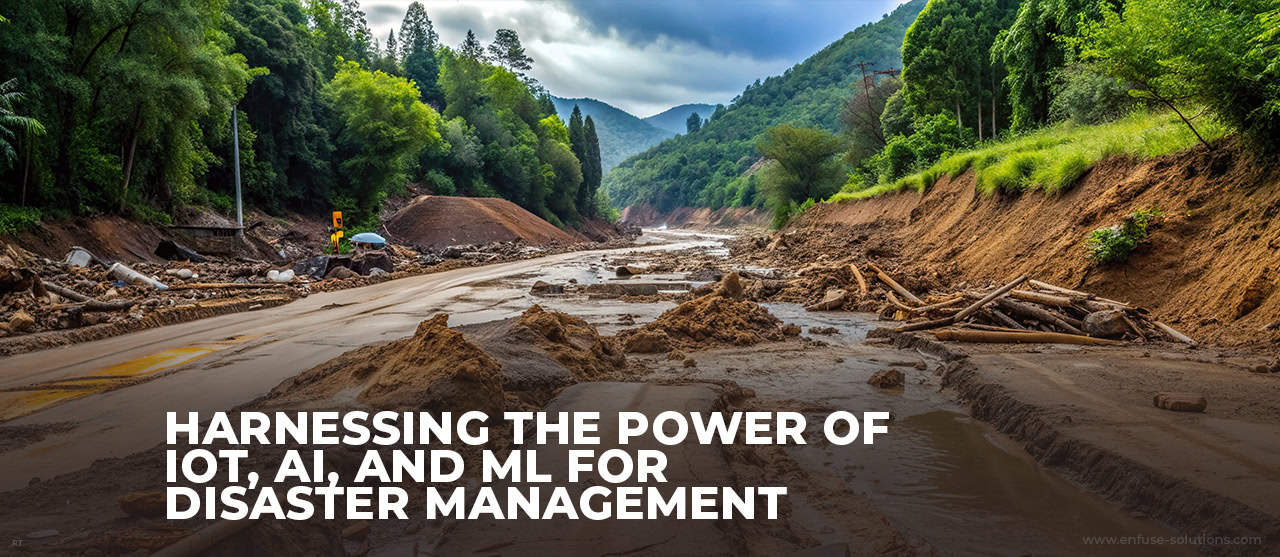
In today’s world, the integration of the Internet of Things (IoT) with Artificial Intelligence (AI) and Machine Learning (ML) is revolutionizing various sectors, including disaster management. These technologies can process large volumes of data in real-time, forecast potential risks, and deliver early alerts, which significantly helps in preventing loss of life and minimizing damage.
For instance, AI and ML models can monitor environmental conditions, detect anomalies, and alert authorities to impending natural disasters, enabling timely evacuations and preparedness. However, as seen in the devastating Wayanad landslide, nature’s fury can still take a toll despite technological advancements. On July 30, 2024, Wayanad in Kerala, India, faced devastating landslides due to continuous rainfall.
The affected areas witnessed fatalities, injuries, and mass displacement of people, and the disaster caused substantial property damage. Despite the tragedy, the deployment of AI and ML by organizations like the Indian Meteorological Department (IMD) and ISRO played a crucial role in issuing early warnings and guiding rescue operations, mitigating what could have been a more significant loss.
The Geological Survey of India highlights that nearly 50% of Kerala’s area is prone to landslides, emphasizing the increasing risks of climate-related disasters and how AI/ML integration can help tackle such disasters in the future. This recent event has highlighted the essential role that Artificial Intelligence (AI) and Machine Learning (ML) play in managing disasters.
Understanding The Causes
Kerala’s hilly regions, with slopes exceeding 20 degrees, were hit hard by the Wayanad landslide, primarily due to over 570 mm of monsoon rainfall in 48 hours. This intense downpour saturated the soil, causing hillsides to collapse and triggering destructive mud and debris flows. Deforestation and haphazard construction have worsened the problem.
On August 1, ISRO’s National Remote Sensing Centre released satellite images showing 86,000 square meters of land sliding at Chooralmala, revealing that heavy rainfall triggered this catastrophic event, widening the nearby Iruvanjippuzha River.
AI & ML: Aiding Early Warning Systems
In the days before the landslide, AI and ML technologies were key in predicting the risk. AI and ML systems, integrated by IMD and ISRO, played a pivotal role in predicting these landslides. These systems analyzed real-time data from IoT sensors, satellite imagery, and weather models, providing timely alerts to local authorities. This proactive approach prompted the evacuation of residents in some areas to relief camps starting on July 29.
Advanced algorithms analyzed data from satellite imagery, weather forecasts, and soil stability, enabling early warnings that saved lives. ISRO’s AI-powered Landslide Monitoring and Prediction System (LMPS) used machine learning to analyze real-time data from sensors across the region. It successfully identified high-risk areas and issued alerts, enabling timely evacuations before the landslide occurred.
A crowdsourced effort led to the development of “Satark,” a meteorology-based landslide prediction model for India’s Western Ghats. This system, created by community scientists with expert assistance, predicts landslides along India’s southwestern coast with 76.5% accuracy, a day in advance.
Post-Tragedy Support Through AI & ML
After predicting the Wayanad landslide, AI and ML were crucial in guiding rescue and relief efforts. AI-powered drones surveyed the affected areas, helping locate survivors. Additionally, AI-driven analytics optimized resource distribution, ensuring aid reached the most vulnerable.
Machine learning models also assessed long-term impacts, providing insights for future disaster planning. On August 9, a mysterious underground noise caused panic in several Wayanad villages. The India Meteorological Department later confirmed seismic activity in parts of Wayanad and Kozhikode.
Enhancements In AI & ML Integration
On July 29, the Hume Centre for Ecology and Wildlife Biology in Kalpetta, Wayanad, notified authorities of a possible landslide in Mundakkai, giving them a 15-hour prior warning. Their accurate prediction was based on micro-level weather data from 200 rain gauges across the district.
Since 2018, they’ve mapped landslides and created a landslide occurrence susceptibility map using GIS techniques. This map considers factors like soil type and land fragmentation. To enhance AI’s effectiveness, integrating it with local knowledge, expanding sensor networks, and refining machine learning models are crucial.
Averting Future Tragedies
To prevent future tragedies like the Wayanad landslide, it is imperative to invest in AI and ML technologies. Governments and local authorities must prioritize the development of early warning systems and ensure that these technologies are accessible to all. Public awareness campaigns about the role of AI in disaster management can also play a vital role in building trust and encouraging community participation.
How EnFuse Solutions Can Contribute
EnFuse Solutions India can play a pivotal role in advancing AI & ML technologies by annotating and labeling data to train models with precision. By leveraging our expertise in AI, we can develop more sophisticated predictive models that consider a wider range of variables, ensuring more accuracy.
Our commitment to AI and ML advancements is driven by the belief that technology can save lives. By integrating cutting-edge AI and ML solutions into systems, EnFuse Solutions India aims to create a safer, more resilient world.
Conclusion
In the end, these harsh tragedies served as a stark reminder of nature’s violent force. However, it also highlighted the potential of AI and ML in disaster prediction, management, and recovery. With continuous advancements and strategic integration, these technologies can play a crucial role in averting such tragedies in the future.
EnFuse Solutions is committed to driving these innovations forward, ensuring that the lessons learned from such disasters translate into safer communities across the globe. To make a meaningful and lasting impact by saving lives using AI/ML, data tagging, and annotation, consider partnering with experts like EnFuse Solutions India.

















Comment